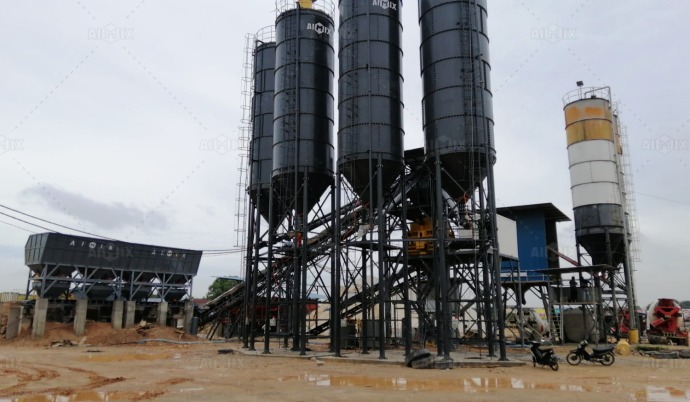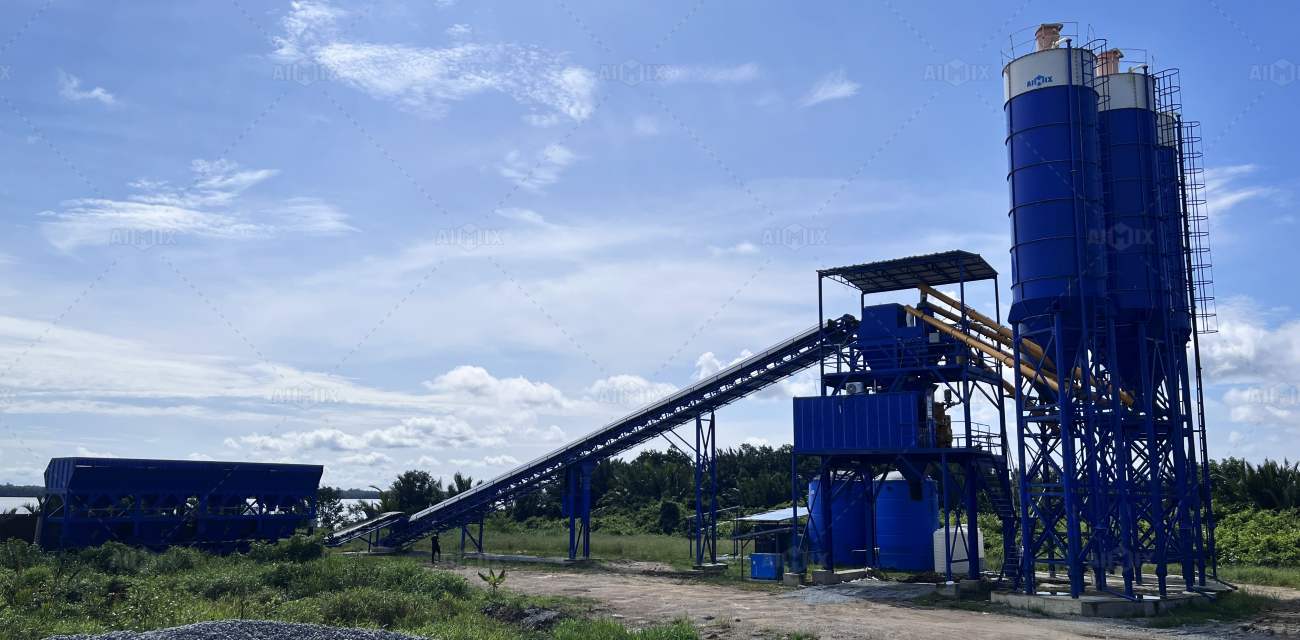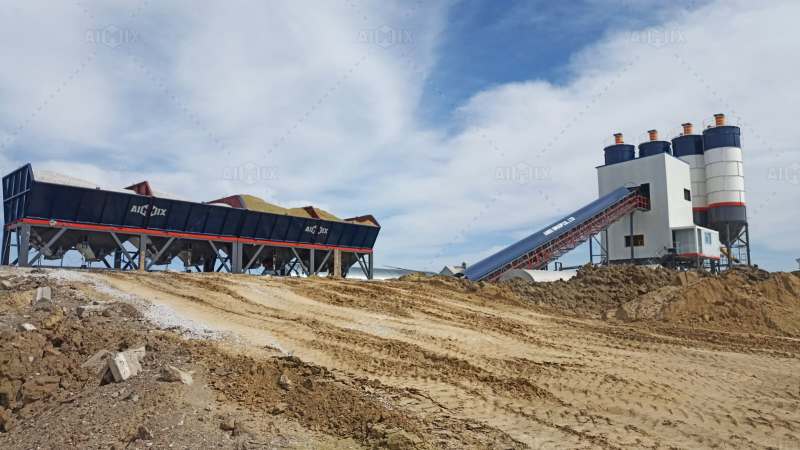In the world of construction, ready mix concrete plants are crucial for providing consistent and high-quality concrete at large scales. As demand for concrete grows across various industries, the technology used in these plants plays a significant role in determining both performance and cost efficiency. The mixing technology integrated into ready mix concrete plants can have a profound impact on the overall cost of the plant, its operation, and the end product’s quality. This article delves into how mixing technology influences the costs of different types of concrete plants, including stationary batching plants, mobile concrete plants, and small concrete batch plants. Get to know more detailed information about ready mix concrete plant cost from the following parts.

Understanding Mixing Technology in Concrete Plants
Mixing technology refers to the machinery and techniques used to combine raw materials such as cement, aggregates, and water to form concrete. The efficiency, speed, and quality of the mixing process significantly affect the cost of operating a ready mix concrete plant. There are several mixing technologies available, ranging from simple, traditional mixers to highly advanced automated systems that ensure precise, uniform mixtures at high volumes. These innovations have helped reduce energy consumption, improve productivity, and minimize material waste, but they can also increase the initial investment and operational costs.
Mixing Technology and Stationary Batching Plants
Stationary batching plants are widely used for large-scale construction projects such as highways, bridges, and commercial buildings. These plants are designed to operate at fixed locations and can handle high-capacity production. The mixing technology in stationary batching plant typically includes more complex machinery and automation systems that enhance accuracy, speed, and consistency in the concrete mixing process.
One of the most significant factors affecting the cost of stationary batching plants is the type of mixer used. Traditional mixers, such as drum mixers or pan mixers, are often less expensive but may not provide the level of uniformity or efficiency required for large projects. On the other hand, twin-shaft mixers and planetary mixers, which are commonly used in high-output stationary plants, offer superior mixing quality and can handle a wider range of materials, ensuring more precise control over the final product. These advanced mixers typically come with a higher upfront cost and maintenance requirements.
While advanced mixing technology can increase the initial investment, the long-term benefits are substantial. With better mixing efficiency and uniformity, the plant can produce concrete more quickly and with less waste, reducing operational costs. Moreover, improved consistency in the concrete mix reduces the likelihood of defects or variations, leading to higher-quality output and fewer issues during construction.
However, the higher cost of advanced mixing technology must be weighed against the production needs of the specific project. For instance, if a stationary batching plant is being used for a large infrastructure project requiring high-strength concrete, investing in the best available mixing technology is likely to be worth the cost, as it will improve the overall quality and efficiency.

Mixing Technology and Mobile Concrete Plants
Mobile concrete plants are an increasingly popular choice for construction companies that need to transport concrete to different job sites. These plants are designed to be easily assembled and disassembled, making them ideal for projects with changing locations or shorter timelines. Like stationary plants, the mixing technology in mobile concrete plants significantly impacts both the initial cost and long-term operational expenses.
Mobile concrete plants generally feature more compact and portable mixers compared to their stationary counterparts. These mixers are typically designed to balance the need for high-quality mixing with the requirement for mobility and ease of transportation. The most common mixers used in mobile concrete plants are drum mixers or planetary mixers, which offer efficient mixing without sacrificing portability.
While mobile concrete plants are often more cost-effective than stationary batching plants, the mixing technology still plays a critical role in their pricing. A mobile concrete plant equipped with advanced mixing technology, such as a high-efficiency twin-shaft or pan mixer, can increase the upfront cost of the plant. However, the improved mixing efficiency and consistency can lead to greater savings in the long run, especially when it comes to reducing the need for rework or ensuring that the concrete meets stringent quality standards.
Additionally, mobile concrete plants are more flexible than stationary plants, as they can be moved from one job site to another. This mobility can help save on logistics costs, particularly in large projects that require concrete at multiple locations. While mobile plants generally have a higher per-unit concrete cost compared to stationary plants due to their smaller production capacities, the operational efficiency brought about by better mixing technology helps mitigate some of these costs.
Mixing Technology and Small Concrete Batch Plants
Small concrete batch plants are often used for smaller-scale projects, such as residential construction, road repairs, or repairs to existing infrastructure. These plants typically have a lower production capacity and simpler mixing technology than their larger counterparts. Despite their smaller scale, the type of mixing technology used in small concrete batch plants still has a significant impact on both the upfront and operational costs.
Smaller plants often use simpler, more cost-effective mixers, such as drum mixers or smaller single-shaft mixers, which are less expensive to purchase and maintain. While these mixers may not offer the same level of precision or efficiency as more advanced technologies, they are well-suited to the needs of small-scale projects where high output and precision may not be as critical.
The cost advantages of using simpler mixing technology are evident, as they reduce both the initial investment and the operational costs associated with running the plant. However, it’s important to note that the quality of the concrete produced may not be as high as that from a plant with more advanced mixing technology. In cases where concrete strength or consistency is paramount, investing in a more advanced mixing system, even for a small concrete batch plant, could be worthwhile.
In contrast, if the project is more focused on speed and cost-effectiveness, small concrete batch plants with basic mixers may be ideal, as they provide the most affordable solution without compromising too much on quality.

Conclusion
The mixing technology used in ready mix concrete plants plays a crucial role in determining both the cost and performance of the plant. Whether you’re investing in a stationary batching plant, mobile concrete plant, or small concrete batch plant, the choice of mixing technology can significantly affect both the initial investment and the long-term operational costs. More advanced mixers typically come with a higher price tag, but they can provide substantial benefits in terms of mixing efficiency, consistency, and reduced waste, which ultimately lead to lower operating costs and higher-quality concrete.
For stationary batching plants used in large-scale projects, investing in high-end mixing technology makes sense for ensuring the best output. For mobile concrete plants, mobility and efficient mixing are key to balancing cost and performance. Meanwhile, small concrete batch plants can benefit from simpler mixing technology that reduces both upfront and operational costs, making them ideal for smaller-scale applications.
Ultimately, the right mixing technology for your ready mix concrete plant depends on the specific requirements of your project, your budget, and your long-term business goals. Understanding how mixing technology influences plant costs will help you make a more informed decision and optimize your investment in concrete production.
